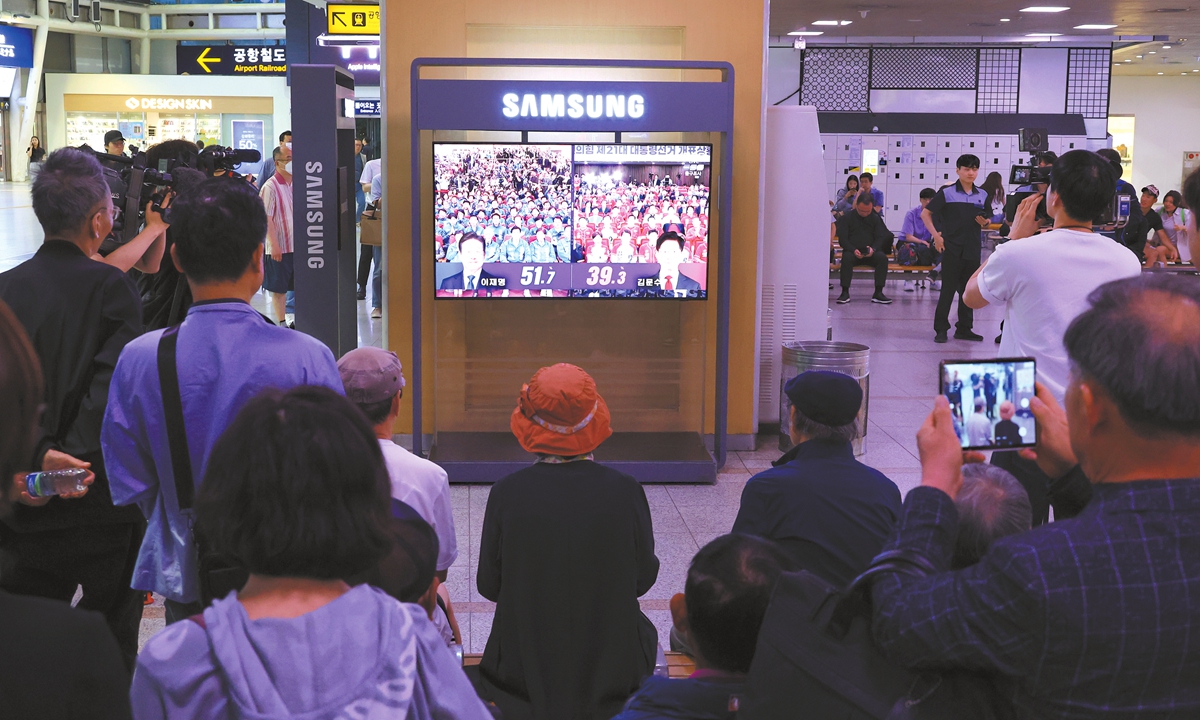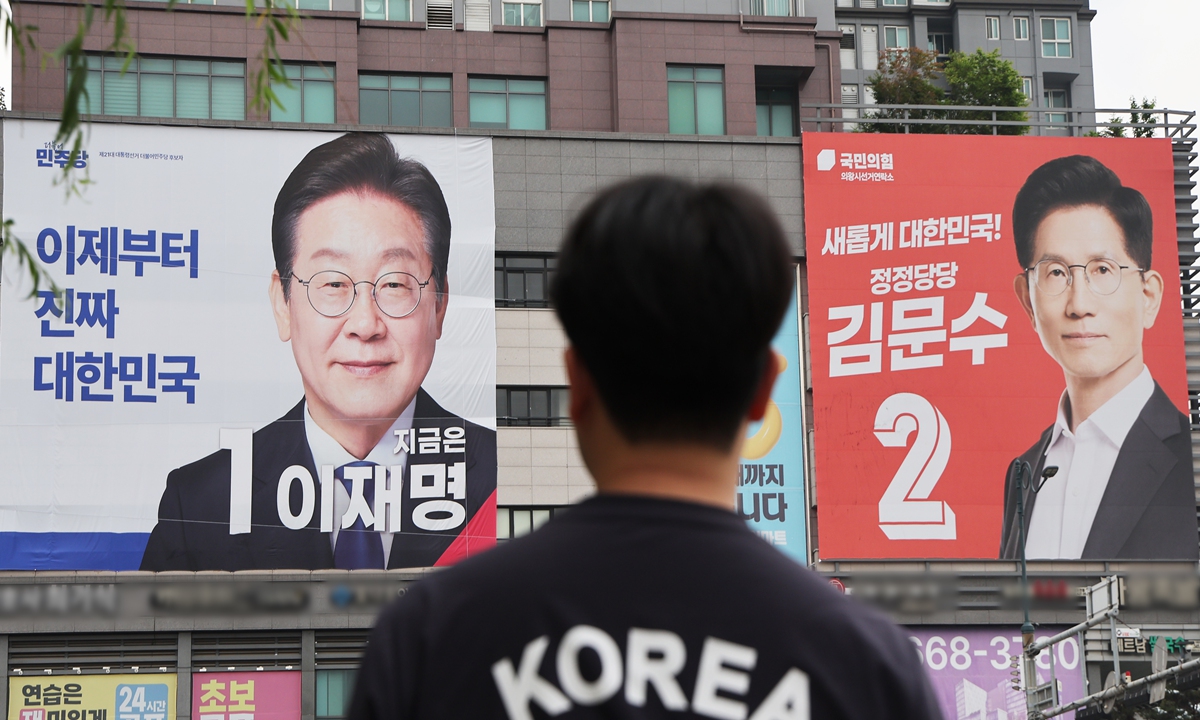Lee Jae-myung to be elected S. Korea's new president with certainty: media
Strategic balance key to rebooting China–South Korea relations: expert

People watch the televised release of exit poll results for the South Korean presidential election in the waiting room of Seoul Station on June 3, 2025. Photo: VCG
Lee Jae-myung, presidential candidate of South Korea's majority liberal Democratic Party, would be elected the country's new president with certainty, local broadcaster JTBC and three terrestrial broadcasters said Tuesday, the Xinhua News Agency reported.
With 40 percent of the votes counted at 11:41 p.m. local time, Lee won 48.89 percent and his archrival Kim Moon-soo of the conservative People Power Party garnered 42.78 percent, according to the National Election Commission.
Lee made a short speech to supporters before making his way to the parliamentary building late Tuesday, according to the report.
A joint exit poll, conducted by three terrestrial broadcasters including KBS, MBC and SBS, showed Lee leading with 51.7 percent of the votes over Kim with 39.3 percent.
Preliminary voter turnout reached 79.4 percent, marking the highest in 28 years since the voting rate recorded 80.7 percent in 1997. The voter turnout, which included those who participated in early voting last Thursday and Friday, was up from 77.1 percent tallied in the previous presidential election in 2022, Xinhua reported.
Chinese analysts noted that it is essential for the new South Korean government to pursue a more balanced diplomatic approach toward China. While it is expected to continue strengthening the South Korea-US alliance and maintaining the stability of the US-South Korea-Japan cooperation framework, it may also strive to repair strained relations with China and Russia and ease tensions with North Korea, as a more balanced diplomatic approach offers flexibility, and particularly stable relations with China fit South Korea's and the region's interests and are conducive to regional peace and stability, analysts said.
Voting for new president
South Koreans voted on Tuesday to pick a new president triggered by the removal from office of former conservative South Korean president Yoon Suk-yeol over his botched martial law bid.
A total of five candidates were vying for the nation's top political office after two dropped out during the campaign, the Yonhap News Agency reported on Tuesday.
Aside from Lee and Kim Moon-soo of the People Power Party, they are Lee Jun-seok of the New Reform Party, Kwon Young-guk of the Democratic Labor Party and Song Jin-ho, an independent, according to the report.
Polling ahead of the election already showed that Lee from the Democratic Party consistently had support of around 50 percent, a large lead over Kim Moon-soo of the People Power Party with about 30 percent, the Xinhua News Agency reported.
The winner of Tuesday's presidential election is to assume office immediately following the confirmation of the electoral results by the South Korea's National Election Commission, likely on Wednesday morning, taking over from acting President Lee Ju-ho, who has led South Korea in a caretaker capacity, according to the Korea Herald.
The inauguration ceremony will likely take place hours later at the National Assembly, though details will be confirmed after the president-elect is determined, Yonhap reported.
Both Lee and Kim have made economic growth their No.1 campaign promise, with an emphasis on nurturing the artificial intelligence industry, the Yonhap News Agency said.
On security issues, Lee has vowed to pursue "pragmatic" diplomacy in response to the changing global order, while Kim has stressed building deterrence against North Korea's nuclear threat, according to Yonhap.
Pragmatic diplomacy
Lee has publicly advocated recharting South Korea's foreign policy away from former South Korean president Yoon's values-based diplomacy - instead calling for a recalibration of ties with China and Russia, underscoring their deep economic interdependence and geographical proximity, the Korea Herald reported in May.
While affirming the South Korea-US alliance as a strategic cornerstone and recognizing the significance of trilateral security cooperation with Washington and Tokyo, Lee has consistently rejected being boxed into binary choices that would come at the expense of ties with Beijing and Moscow, according to South Korean media.
Lee's "pragmatic" foreign policy can be seen as a reflection on the previous administration's "values-based diplomacy," arguing that a one-sided tilt toward the US did not truly advance South Korea's national interests, Dong Xiangrong, a senior research fellow at the National Institute of International Strategy, Chinese Academy of Social Sciences, told the Global Times on Tuesday.
During Yoon's tenure, China-South Korea relations fell to a low point, particularly after Yoon suffered from a political crisis following a failed attempt at imposing martial law, conspiracy theories and xenophobic rhetoric have gained traction, which fueled the deterioration in public opinion toward China and a concerning surge in anti-China sentiment within South Korea, Dong noted.
"As close neighbors, China and South Korea share common interests in maintaining peace, stability and prosperity in Northeast Asia, and they are also vital economic and trade partners. It is clear that the new administration will need to repair and recalibrate its China policy, working to restore and reinvigorate the bilateral relationship," she said.
At his final press conference before the election on Monday, when asked by a reporter from China's Phoenix TV how he would handle relations with China if elected, Lee responded that whether it is China, Japan, Russia, or the US, from South Korea's standpoint, it needs to establish friendly relations with all of them.
"However, the South Korea-US alliance is the foundation of our foreign policy - that's the reality. It is extremely important. I believe we need to continue to expand and deepen the alliance with the US going forward," Lee was quoted as saying in the media report.
Global supply chains cannot be entirely aligned with ideological issues, and the South Korea-US-Japan cooperation framework also deserves focused attention. "But there's no need to turn our relationships with other countries into hostile ones," Lee said.
There are also structural contradictions within the China-South Korea relationship, some experts said.
For example, on the economic front, the bilateral dynamic is gradually shifting from one primarily characterized by complementarity to one marked by both competition and complementarity - or even, in some sectors, by dominant competition. Against this backdrop, finding ways to seek cooperation amid competition has become a new and pressing challenge for both sides, Dong noted.
The foreign policy positions of Lee and Kim reflect the ideological orientations of South Korea's progressive and conservative camps, respectively. While there are clear differences between the two, they do not represent fundamental or irreconcilable divergences, Xiang Haoyu, a research fellow at the China Institute of International Studies, told the Global Times on Tuesday.
Where they differ is that Lee advocates a more balanced approach between the US and China, meaning that South Korea should rely on the US for security while maintaining strong economic ties with China, Xiang noted. "However, the recent rising economic competition within the China-South Korea relationship has posed new challenges to the traditional progressive approach toward China," he said.
In an interview published by the Chinese Foreign Ministry in April, Chinese Ambassador to South Korea Dai Bing said amid the profound and complex changes taking place in the international and regional landscape, the strategic importance of maintaining and advancing China-South Korea relations has become even more evident. Both history and realities have shown that adhering to friendly cooperation best serves the fundamental interests of both countries, Dai said.
South Korea's commitment to a friendly policy toward China is the right course of action. Deterioration in China-South Korea relations would bring nothing but harm, with no benefit to either side, Dai said.


